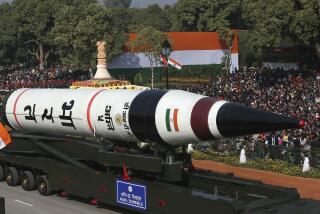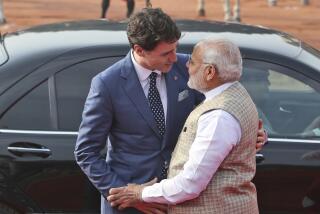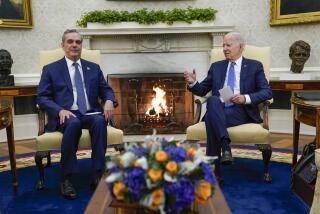India courts Africa, long wooed by China
Indian Prime Minister Manmohan Singh arrives Thursday in Tanzania on the last stop of a six-day Africa trip designed to underscore his nation’s growing stature on the global stage, lobby for a permanent seat on the U.N. Security Council and signal to China that the South Asian giant is also a player on the resource-rich continent.
China has long targeted Africa under its “Going Out” strategy launched in 1998, and India, as part of a bid to make up for lost time, this week participated in the India-Africa Forum Summit, its second in three years. New Delhi said it would extend a $5-billion line of credit, fund 22,000 scholarships, set up a “virtual university” and support infrastructure and training programs on the continent.
“India will work with Africa to realize its vast potential,” Singh said Tuesday on the first day of the two-day conference in Addis Ababa, Ethiopia, his only other stop on the tour. “We do not have all the answers but we have some experience in nation building which we are happy to share.”
Both India and China want to secure access to the continent’s natural resources, expand influence and bolster African support in international organizations such as the United Nations, though the level of competition shouldn’t be overstated, analysts said.
Africa isn’t exactly complaining about the attention.
“Africa enjoys this very much,” said Alex Vines, head of the Africa program at London’s Chatham House, a think tank. “It can negotiate a better deal, particularly knowing that India and China are involved.”
In China’s favor, it got a head start and has significantly more money to work with. Africa’s trade with China was about three times its trade with India in 2010: $127 billion versus $40 billion. The gap is expected to widen by 2015.
India may have certain soft-power advantages, including its Bollywood film industry as well as widespread English fluency and a history of living under British colonial rule that it shares with many African countries. There is also a significant Indian diaspora in Africa.
As resentment of China grows in some African countries, driven by concern that its companies employ only Chinese and that it is taking on a neo-colonial role with its growing wealth, India enjoys a more positive image.
“Africa is a priority for us,” said R.N. Das, a senior fellow at New Delhi’s Institute of Defense Studies and Analysis. “The Chinese have a lot of resources, we can’t really compete on that, but more of our focus comes from the private sector.”
But while Beijing has made Africa a top foreign policy priority, sending its premier or president to the continent almost every year, top-level Indian visits are few and far between, African analysts note.
For a China-Africa summit held in Beijing in November 2006, China flew in 48 African heads of state, posted 10-foot-tall cutout zebras and giraffes throughout the capital, fitted out hotel rooms with African furniture, cleared the roads of traffic and plastered the city with “Africa, the Land of Myth and Miracles” signs.
This week’s India-Africa summit in Addis Ababa attracted 15 African leaders.
“China has a strategy to keep creating jobs in manufacturing and it wants to get higher up that ladder” by selling more to Africa, said Mohan Guruswamy, chairman of New Delhi’s Center for Policy Alternatives, a government-funded think tank. “India has no clear strategy.”
Some of India’s perceived shortfalls reflect its often creaky bureaucracy and the small size of its External Affairs Ministry, which with about 750 diplomats is only a fraction of China’s 6,000-strong diplomatic corps. In recent years, however, India has funded more think tank and university positions to enhance its understanding of the African political landscape.
Indian officials face more flak from voters, some of whom wonder why they are offering loans to Africa when, by some calculations, there are more poor people in India than in Africa’s 54 countries combined. China faces less resistance, given an authoritarian government, greater wealth and the better job it has done addressing poverty at home.
India’s defense establishment has often emphasized the nation’s rivalry with China in the Indian Ocean, in part to boost its budgets. And Washington has encouraged India to expand its presence in the region, particularly to combat piracy.
On the resources front, India has generally done well securing diamonds for its vibrant gem-cutting industry, as well as coal and uranium, while China has done a better job securing oil contracts.
Just how much Africa can gain from its suitors remains to be seen, analysts said.
“In the end, it depends on good African governments to get good deals for its people,” said Vine of Chatham House. “That gets back to the major challenge for Africa: governance and corruption.”
Anshul Rana in The Times’ New Delhi bureau contributed to this report.
More to Read
Start your day right
Sign up for Essential California for news, features and recommendations from the L.A. Times and beyond in your inbox six days a week.
You may occasionally receive promotional content from the Los Angeles Times.






